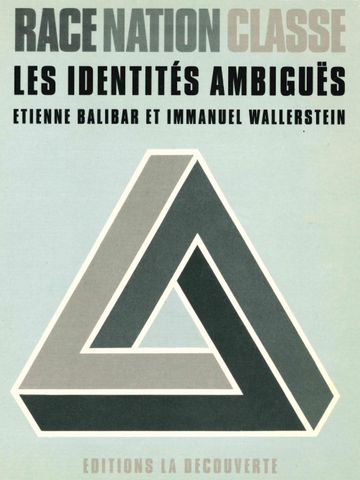Race, Nation, Class. Ambiguous Identities
Notes on the volume by Étienne Balibar and Immanuel Wallerstein (first published in French in 1988)

Balibar and Wallerstein’s Race, Nation, Class. Ambiguous Identities traces fundamental contradictions of the historical categories of “race,” “nation,” and “class” in capitalism. Theoretically, racism and nationalism ought to be disadvantageous for capitalism’s smooth functioning, as they restrict and organise the potential amount of exploitable labour according to non-profit-oriented criteria. States, on the other hand, prove themselves problematic because they prevent or regulate capital flows. Yet the capitalist mode of production has asserted itself across the board without doing away with the nation form or curtailing racism. That said, both nation and racism change in different contexts and repeatedly bring forth new conjunctures.
Balibar and Wallerstein’s historical analysis works out how racism emerges in connection with the constitution of classes and, in doing so, secures social stratification while at the same time being constitutive for the formation of “state” and “the people” in the way it allows for a relatively flexible organisation of (internal) in- and exclusions. Nationalism, for its part, mobilises society for both a state’s demarcation vis-à-vis others as well as for imperialist strategies. Not least, racism creates concrete realities in which people are threatened and forced to live under miserable conditions – while others are privileged. Frantz Fanon’s insights into how racism is produced and reproduced as a social relation can clearly be seen here.
The book also lays out racism’s historical transformation and mutability: in its current form, it works less with naturalisations in terms of biological categories so much as it construes – and in turn naturalises – cultures which are portrayed as eternal and unchanging. At the same time, this culturalistically grounded racism which portrays some people as physically and psychologically incapable of certain kinds of work combines with a meritocratic outlook. In this way, “resentment of those who receive greater rewards by those who receive fewer is less intense […] because its justification is offered on the basis of merit and not on the basis of tradition. That is, it is thought that privilege earned by merit is somehow more acceptable, morally and politically, to most people than privilege earned by inheritance.” (Immanuel Wallerstein)
Race, Nation, Class demonstrates how these categories – which at first glance appear to relate to one another in a way deeply productive for all forms of domination – come into conflict with one another. The book thus shows in sublime fashion what every political strategy seeking to work against these categories must understand: firstly, that the historical categories of “race,” “nation” and “class” can renew themselves in their constellation, secondly, that it is necessary to utilise their contradictions, and that thirdly, they cannot be circumvented.